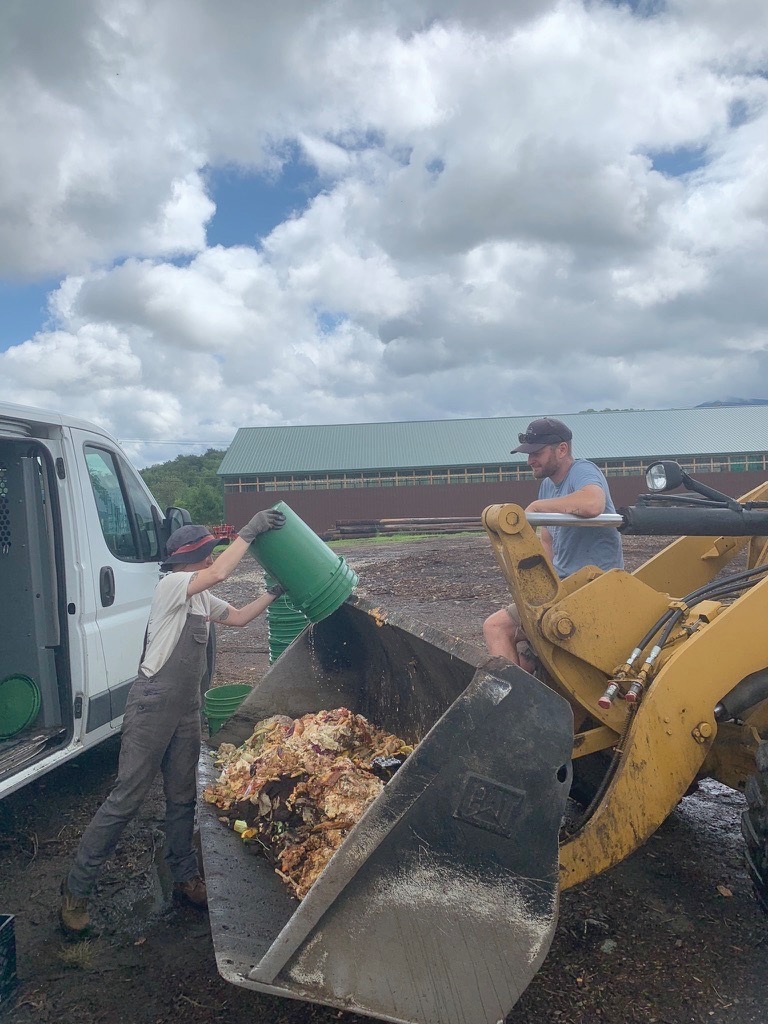Composting in the North Country : How has St. Lawrence Taken it Up?
Carter Rowley is sticking a giant thermometer into a pile of what looks like dirt. “Right here, I just turned this pile. Can you smell it?” Rowley asks. I think it smells like wood. But Rowley says there’s a lot more to it than that: “I guess I’m like a compost sommelier so I was going to go with rich oak tannins, and then also silage. It kind of reminds me of the nostalgic smells from a country fair. That’s what compost should smell like.”
Rowley owns Blue Line Compost in Bloomingdale, outside of Saranac Lake. He says he’s composted his food scraps his whole life. It always seemed like the most logical thing to do, and he wanted to bring the service to his community. “Honestly, I see our local environment and certainly the global environment changing rapidly and it really scares me,” says Rowley. “I could keep doing my other job and building second and third homes for people that’s just incredibly consumptive, or I could try to do something that’s making a difference.”
Food waste in landfills makes up between 8-10 percent of greenhouse gas emissions, largely from methane produced when food breaks down without oxygen. Rowley says that’s why oxygen is a key player in the science of composting. “So, one of our jobs is to make sure that these piles have plenty of oxygen so that the thermophilic bacteria can thrive and if it doesn’t have enough oxygen you’re going to get that really gross, noxious smell that everyone’s afraid of with composting.”
As of January 2022, New York requires businesses that produce more than two tons of food waste per week and are within 25 miles of a composting facility to compost. And lawmakers are considering halving that to one ton. Now restaurants, universities, and hospitals need to figure out a new system. Sue Powers at Clarkson University is helping connect them to local programs that can process their food scraps. “We can expect that more businesses will have to comply and therefore they need to have these services and that’s part of the reason that we’re working hard to support these community-scale compost businesses,” she says.
St. Lawrence falls into the category of organizations that will need to develop a new way processing food waste in the wake of this legislation. According to Sam Voter ’25, an environmental studies major focusing his Senior Year Experience on tackling SLU’s composting system, we have a few options. Either we start sending our food waste to North Country Compost in Canton, which just got certified by the Department of Environmental Conservation to process commercial food waste, or we improve the on-campus composting site we do have, which is located near the horse stables.
Although sending our food waste to the Canton facility would sustain a small business and contribute to the local economy, Voter says that it would cost the university a lot of money they may not be willing to spend right now. That’s why he’s trying to get our existing composting site certified by the DEC to process large volumes of food waste. “Becoming DEC certified could be a not-insignificant upfront cost, but in the long term it would save the school a lot of money,” he says.
Voter says the biggest issue right now is that SLU is only composting a very small percentage of its pre-consumer food waste. “To meet the specifications of the DEC for institutions that generate x amount of waste, we have to be composting all of it.” He says even if we aren’t legally required to sustainably manage our food waste, it’s the right thing to do. The first step of Voter’s project will be developing a report to determine if our site meets DEC specifications, and what we need to change if not. Until then, it’s in the university’s hands to decide how to adapt to this legislation and build systems to make this institution more sustainable for generations to come.
Some of this article was produced while the author was working with North Country Public Radio as a McDonald Journalism Intern. Find that version here.



